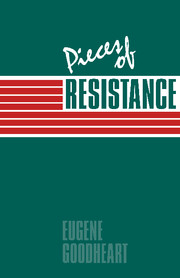Book contents
- Frontmatter
- Contents
- Preface
- Acknowledgments
- Autobiographical
- Part I Critics and criticism
- 1 William Chace's Lionel Trilling: Criticism and Politics
- 2 Philip Rahv and Image and Idea
- 3 Joseph Frank's Dostoevsky: The Seeds of Revolt 1821–1849
- 4 Leslie Fiedler and the mythic life
- 5 The “radicalism” of Susan Sontag
- 6 Paul Goodman's neolithic conservatism
- 7 Geoffrey Hartman's Criticism in the Wilderness: The Study of Literature Today
- Part II Contemporary culture in conflict
- Part III Writing in America and elsewhere
7 - Geoffrey Hartman's Criticism in the Wilderness: The Study of Literature Today
Published online by Cambridge University Press: 05 August 2012
- Frontmatter
- Contents
- Preface
- Acknowledgments
- Autobiographical
- Part I Critics and criticism
- 1 William Chace's Lionel Trilling: Criticism and Politics
- 2 Philip Rahv and Image and Idea
- 3 Joseph Frank's Dostoevsky: The Seeds of Revolt 1821–1849
- 4 Leslie Fiedler and the mythic life
- 5 The “radicalism” of Susan Sontag
- 6 Paul Goodman's neolithic conservatism
- 7 Geoffrey Hartman's Criticism in the Wilderness: The Study of Literature Today
- Part II Contemporary culture in conflict
- Part III Writing in America and elsewhere
Summary
“The critic today,” Geoffrey Hartman remarks in The Fate of Reading, “is as necessary and as ineffectual as ever” – necessary because the poem or novel demands an answer equal to its imaginative claim and ineffectual because the usual answers are either “a hygienic response, deflating every speculation,” what Hartman calls plain-style criticism, or system building, which tries to legislate rules for criticism (e.g., the work of Northrop Frye). Of the two types of critics, Hartman prefers the system builders, because they are makers, “the unacknowledged poets of our time”; but he would go beyond them to discover or invent a mode of interpretation that has the freedom of poetic imagination. “To interpret is a creative, and at times willful, act, as everyone knows who has considered the history of a discipline far wider and deeper than ‘criticism.’” Unlike Frye, for instance, Hartman believes that the imaginative experience of the creative writer necessarily “contaminates” the study of literature, resulting in a critical style characterized by metaphor, paradox, ambiguity, and ellipsis. Jacques Derrida's Glas, which turns “criticism” into an outrageous exercise of Joycean wordplay, becomes for Hartman an extreme provocation, if not a model, for critical style. Hartman fully understands the risk of “contagion,” which, he says in Criticism in the Wilderness, may “evoke in us a sense of leprous insubstantiality, however witty and explosive, however energetic,” the play of language may be.
- Type
- Chapter
- Information
- Pieces of Resistance , pp. 63 - 68Publisher: Cambridge University PressPrint publication year: 1987



